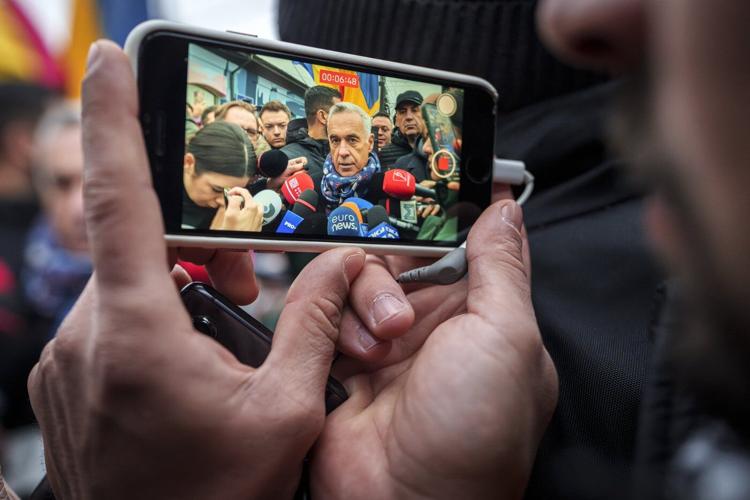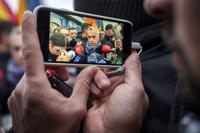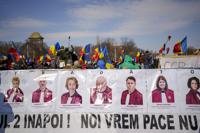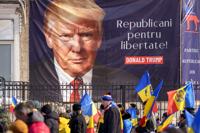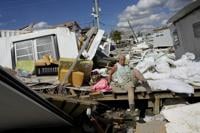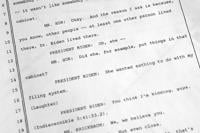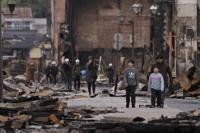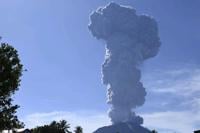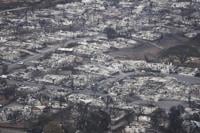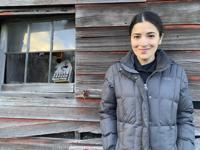BUCHAREST, Romania (AP) — Romanians are confronting a deluge of online disinformation ahead of a fraught presidential election redo next week, including ominous claims that the NATO member country is surging toward “imminent war” with Russia.
The campaign, attributed to unidentified anti-government and pro-Russian actors, underscores how large social media platforms can be exploited to fuel distrust and spin anti-Western narratives.
It's also a somber lesson for other democracies across the European Union.
What happened in Romania?
Romania’s political landscape was shaken last November when , a little-known, far-right populist, won the most votes in the first round of the presidential election, advancing to the runoff against reformist Elena Lasconi of the progressive Save Romania Union party.
Soon, allegations emerged of promoting Georgescu, following declassified intelligence showing a highly-sophisticated, coordinated campaign via TikTok. Moscow denied it meddled.
Romania’s Constitutional Court then annulled the vote and ordered a redo.
Georgescu, who has praised Russian President and criticized NATO and the EU, is now under criminal investigation. In March, he was redo, prompting , as his incensed supporters staged protests that descended into violence.
What happened in Romania unnerved Brussels and raised questions about foreign interference.
What did Brussels do?
The EU Commission responded by to determine whether it had violated the EU’s Digital Services Act in failing to deal with risks to Romania’s election. Some 8.5 million Romanians aged 18 and above use the platform in the country of about 19 million.
For its part, TikTok said it dismantled in December covert influence networks targeting Romanians, removing over 27,000 accounts that posted comments via a “fake engagement vendor” promoting the far-right Alliance for the Unity of Romanians party and Georgescu. It also removed more than 1,100 accounts impersonating presidential candidates of all stripes.
TikTok also said it has taken steps to protect Romania’s election integrity, including expanding its team of Romanian-speaking content moderators, partnering with a local fact-checking group, and in-app tools linking to official election information.
But the disinformation didn't stop and it wasn't just confined to TikTok. The declassified intel indicated other platforms — Telegram, Facebook and YouTube — were also used, though to a lesser extent.
How does disinformation work?
Unlike misinformation, which covers any false information, including honest mistakes and misunderstandings, disinformation refers to , mainly to confuse or mislead.
According to Funky Citizens, a Romanian nongovernmental organization, those behind disinformation use emotional triggers — such as claims of betrayal, injustice or existential threat — “to erode trust in democratic institutions” and “create a parallel political reality.”
The NGO warned in April of a “vast ecosystem” of false narratives around Georgescu, who is now being promoted in this online sphere as “the legitimate president of Romania.”
Some of the narratives claim that annulling the election was a coup, supported by the “EU, globalist elites, and intelligence agencies” and portray Romania as a "victim of European or Western control.”
Others warn of “imminent war” with Russia or predict that conscription and martial law are next. A post on TikTok, now removed, tells Romanians that within a month, their ”children will be sent to war.”
What has complicated matters is that many Romanians feel the authorities have failed to sufficiently explain what led to the annulment of the November election, Elena Calistru, who runs Funky Citizens, told The Associated Press.
“The fact that we didn’t have this kind of post-mortem of what happened, as well as the lack of accountability, is also fueling distrust,” she said.
Expert Forum, a Romanian think-tank, said this week that online political campaigning has “entered a new era, dominated by an industry of political promotion through inauthentic networks.”
“We are witnessing an explosion of masked, coordinated and candidate-friendly content, created with the aim of simulating popular support and influencing public perception,” it said.
Cristian Andrei, a political consultant in Bucharest, says “disinformation is here to stay” and won't magically disappear ahead of Sunday's rerun.
A growing threat
The EU’s diplomatic service has labelled foreign interference, including disinformation, a “growing security and foreign policy threat.”
Last year, online disinformation surged ahead of the and Moldova, an EU candidate country, also faced an alleged onslaught of Russian interference in two key ballots last fall.
Cyabra, an AI-powered platform that uncovers online disinformation, fake accounts, and influence campaigns, analyzed the discourse on X in Romania related to the pro-Georgescu protests between March 6 and April 6.
Sharing its findings with the AP, it said it has determined that 45% of 639 accounts were fake — well above the usual 7–10% baseline.
Cyabra's CEO Dan Brahmy said these accounts "created a fake consensus, making it seem like everyone was outraged — when half of that ‘everyone’ didn’t even exist.”
In a 2024 report, X said its human moderators “proactively conduct manual content reviews” in high-priority categories — such as election-related content, as part of its compliance with EU rules.
Still, critics argue that under 's ownership, X has become a hotbed of disinformation.
Calistru, of Funky Citizens, expects “hybrid attacks on our electoral system” to intensify in Romania ahead of next Sunday's vote. Eleven candidates are vying for the top job and if none wins more than 50% of the ballots, a runoff will be held two weeks later.
Adding to the storm were remarks by U.S. Vice President JD Vance, and Musk, who like Moscow criticized Romania for voiding last year’s election and barring Georgescu from the May vote.
“If your democracy can be destroyed with a few hundred thousand dollars (euros) of digital advertising from a foreign country — then it wasn’t very strong to begin with,” Vance said at the in February.
What are Romanian authorities doing?
Between April 13 and April 20, Romania's Central Election Bureau stepped up enforcement. It approved 153 complaints and ordered the removal of more than 500 online posts — including unverified content from anonymous accounts, mislabeled ads by politicians and posts by people who don't hold public office but could possibly influence the electorate.
It's a difficult balancing act — protecting freedom of expression and defending democracy against disinformation. Some of the election bureau's removals drew criticism and accusations of silencing political views of private citizens, which it denies.
Lasconi, who was to face Georgescu in the runoff and is running in Sunday's election, said she was mocked when she warned of interference last year.
“No one took me seriously," she said. “It turns out I was right.”

